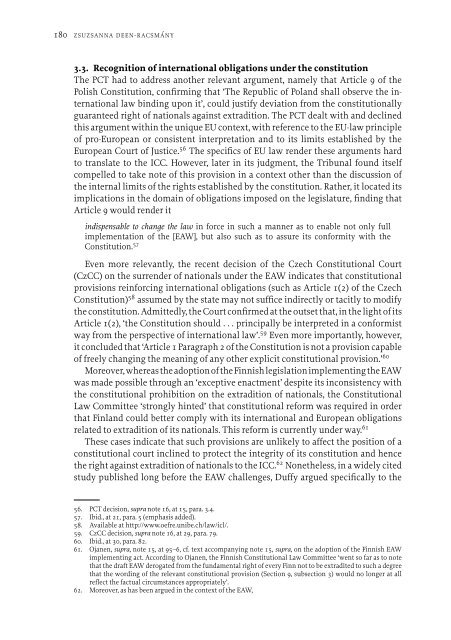Lessons of the European Arrest Warrant for Domestic ...
Lessons of the European Arrest Warrant for Domestic ...
Lessons of the European Arrest Warrant for Domestic ...
Create successful ePaper yourself
Turn your PDF publications into a flip-book with our unique Google optimized e-Paper software.
180 ZSUZSANNA DEEN-RACSMÁNY3.3. Recognition <strong>of</strong> international obligations under <strong>the</strong> constitutionThe PCT had to address ano<strong>the</strong>r relevant argument, namely that Article 9 <strong>of</strong> <strong>the</strong>Polish Constitution, confirming that ‘The Republic <strong>of</strong> Poland shall observe <strong>the</strong> internationallaw binding upon it’, could justify deviation from <strong>the</strong> constitutionallyguaranteed right <strong>of</strong> nationals against extradition. The PCT dealt with and declinedthis argument within <strong>the</strong> unique EU context, with reference to <strong>the</strong> EU-law principle<strong>of</strong> pro-<strong>European</strong> or consistent interpretation and to its limits established by <strong>the</strong><strong>European</strong> Court <strong>of</strong> Justice. 56 The specifics <strong>of</strong> EU law render <strong>the</strong>se arguments hardto translate to <strong>the</strong> ICC. However, later in its judgment, <strong>the</strong> Tribunal found itselfcompelled to take note <strong>of</strong> this provision in a context o<strong>the</strong>r than <strong>the</strong> discussion <strong>of</strong><strong>the</strong> internal limits <strong>of</strong> <strong>the</strong> rights established by <strong>the</strong> constitution. Ra<strong>the</strong>r, it located itsimplications in <strong>the</strong> domain <strong>of</strong> obligations imposed on <strong>the</strong> legislature, finding thatArticle 9 would render itindispensable to change <strong>the</strong> law in <strong>for</strong>ce in such a manner as to enable not only fullimplementation <strong>of</strong> <strong>the</strong> [EAW], but also such as to assure its con<strong>for</strong>mity with <strong>the</strong>Constitution. 57Even more relevantly, <strong>the</strong> recent decision <strong>of</strong> <strong>the</strong> Czech Constitutional Court(CzCC) on <strong>the</strong> surrender <strong>of</strong> nationals under <strong>the</strong> EAW indicates that constitutionalprovisions rein<strong>for</strong>cing international obligations (such as Article 1(2) <strong>of</strong> <strong>the</strong> CzechConstitution) 58 assumed by <strong>the</strong> state may not suffice indirectly or tacitly to modify<strong>the</strong> constitution. Admittedly, <strong>the</strong> Court confirmed at <strong>the</strong> outset that, in <strong>the</strong> light <strong>of</strong> itsArticle 1(2), ‘<strong>the</strong> Constitution should ...principally be interpreted in a con<strong>for</strong>mistway from <strong>the</strong> perspective <strong>of</strong> international law’. 59 Even more importantly, however,it concluded that ‘Article 1 Paragraph 2 <strong>of</strong> <strong>the</strong> Constitution is not a provision capable<strong>of</strong> freely changing <strong>the</strong> meaning <strong>of</strong> any o<strong>the</strong>r explicit constitutional provision.’ 60Moreover,whereas<strong>the</strong>adoption<strong>of</strong><strong>the</strong>Finnishlegislationimplementing<strong>the</strong>EAWwas made possible through an ‘exceptive enactment’ despite its inconsistency with<strong>the</strong> constitutional prohibition on <strong>the</strong> extradition <strong>of</strong> nationals, <strong>the</strong> ConstitutionalLaw Committee ‘strongly hinted’ that constitutional re<strong>for</strong>m was required in orderthat Finland could better comply with its international and <strong>European</strong> obligationsrelated to extradition <strong>of</strong> its nationals. This re<strong>for</strong>m is currently under way. 61These cases indicate that such provisions are unlikely to affect <strong>the</strong> position <strong>of</strong> aconstitutional court inclined to protect <strong>the</strong> integrity <strong>of</strong> its constitution and hence<strong>the</strong> right against extradition <strong>of</strong> nationals to <strong>the</strong> ICC. 62 None<strong>the</strong>less, in a widely citedstudy published long be<strong>for</strong>e <strong>the</strong> EAW challenges, Duffy argued specifically to <strong>the</strong>56. PCT decision, supra note 16, at 15, para. 3.4.57. Ibid., at 21, para. 5 (emphasis added).58. Available at http://www.oefre.unibe.ch/law/icl/.59. CzCC decision, supra note 16, at 29, para. 79.60. Ibid., at 30, para. 82.61. Ojanen, supra, note 15, at 95–6, cf. text accompanying note 15, supra, on <strong>the</strong> adoption <strong>of</strong> <strong>the</strong> Finnish EAWimplementing act. According to Ojanen, <strong>the</strong> Finnish Constitutional Law Committee ‘went so far as to notethat <strong>the</strong> draft EAW derogated from <strong>the</strong> fundamental right <strong>of</strong> every Finn not to be extradited to such a degreethat <strong>the</strong> wording <strong>of</strong> <strong>the</strong> relevant constitutional provision (Section 9, subsection 3) would no longer at allreflect <strong>the</strong> factual circumstances appropriately’.62. Moreover, as has been argued in <strong>the</strong> context <strong>of</strong> <strong>the</strong> EAW,
















